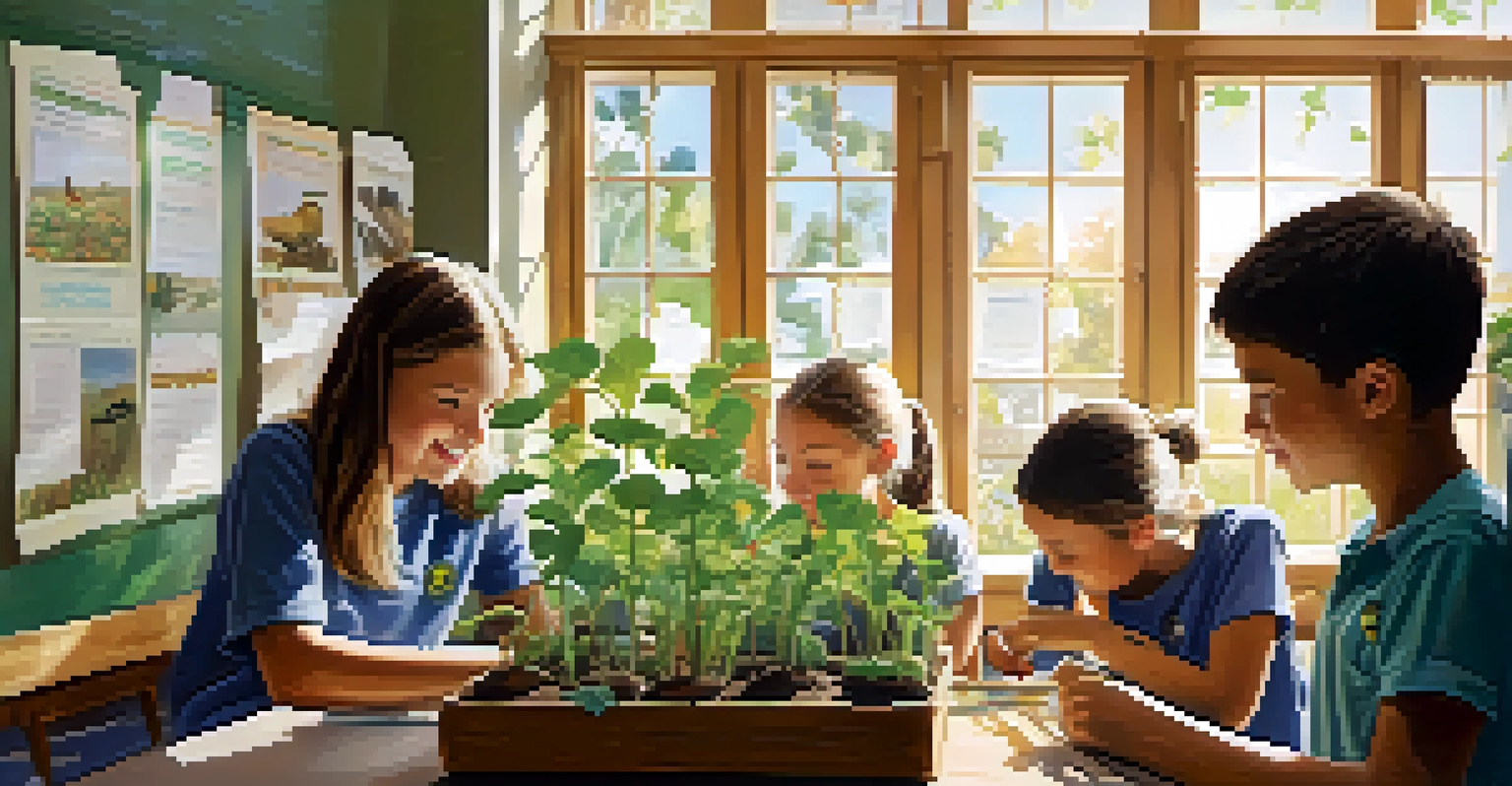Educational Programs for Environmental Awareness in Savannah

Importance of Environmental Awareness in Savannah
Environmental awareness is crucial for the sustainable development of Savannah, a city rich in natural beauty. With its unique ecosystems, including wetlands and coastal areas, understanding and protecting these environments is essential. By fostering environmental awareness, residents can make informed decisions that positively impact their surroundings.
The environment is where we all meet; where we all have a mutual interest; it is the one thing all of us share.
Savannah's geographical location makes it particularly vulnerable to climate change and environmental degradation. This vulnerability highlights the need for educational programs that emphasize the importance of conservation and responsible stewardship. Educating the community can lead to collective action, ensuring a healthier environment for future generations.
Moreover, increased awareness can lead to a more engaged community that actively participates in local conservation efforts. This engagement not only helps protect Savannah's natural resources but also strengthens community ties, creating a collective sense of responsibility towards the environment.
Local Organizations Leading the Charge
Several local organizations in Savannah are dedicated to promoting environmental education. Groups like the Savannah Riverkeeper and the Georgia Conservancy offer programs that teach residents about local ecosystems, conservation practices, and sustainable living. Their initiatives often include hands-on activities that make learning about the environment engaging and impactful.

These organizations frequently collaborate with schools and community centers to reach a broader audience. By providing workshops, field trips, and interactive experiences, they help instill a sense of environmental responsibility in both children and adults. This grassroots effort is vital for creating a culture of sustainability within the community.
Community Engagement Drives Awareness
Local organizations and community events play a vital role in enhancing environmental awareness and fostering a sense of collective responsibility among residents.
The work of these organizations is not just about education; it's about inspiring action. By equipping individuals with knowledge and skills, they empower the community to make informed choices that benefit the environment, demonstrating that local initiatives can lead to significant change.
School Initiatives for Environmental Education
Savannah's schools are increasingly integrating environmental education into their curricula. Programs that focus on sustainability, biodiversity, and ecological conservation are becoming more common, providing students with a foundational understanding of environmental issues. This early education is key to fostering a generation that values and protects the planet.
We won't have a society if we destroy the environment.
Many schools partner with local organizations to offer field trips to natural reserves and coastal areas, giving students firsthand experience with their local environment. These experiences not only enhance classroom learning but also encourage a deeper connection to nature. Students often come away inspired to take action in their own lives.
Furthermore, school projects that emphasize recycling, gardening, and energy conservation empower students to implement sustainable practices at home. By making environmental awareness a part of daily school life, Savannah is nurturing environmentally conscious citizens who will carry these values into adulthood.
Community Workshops and Events
Community workshops and events play a pivotal role in enhancing environmental awareness in Savannah. These gatherings often focus on practical skills, such as composting, native gardening, and reducing waste. By providing hands-on learning opportunities, these events make it easier for residents to adopt sustainable practices in their daily lives.
Events like Earth Day celebrations and local clean-up days foster a sense of community and collective responsibility. They bring people together to work towards a common goal while having fun and learning about the importance of preserving the environment. These shared experiences can spark lasting friendships and collaborations among participants.
Schools Foster Future Environmentalists
Integrating environmental education into school curricula empowers students with knowledge and practical skills to protect their local ecosystems.
In addition to skill-building, these workshops often highlight the interconnectedness of environmental issues. Participants leave with a better understanding of how their actions affect the local ecosystem and are encouraged to take steps toward a more sustainable lifestyle.
Youth Programs Promoting Environmental Stewardship
Youth programs focused on environmental stewardship are essential for engaging the younger generation in Savannah. Programs like summer camps and after-school clubs offer kids a chance to explore nature while learning about conservation and sustainability. These experiences can ignite a passion for environmentalism that lasts a lifetime.
Through activities like wildlife monitoring, tree planting, and community gardening, young participants gain practical skills that empower them to make a difference. Such programs also foster teamwork and leadership, as participants often work together on projects that benefit their community and local ecosystems.
Moreover, these youth initiatives encourage participants to become advocates for environmental causes. Many kids leave these programs inspired to educate their peers and families, creating a ripple effect that extends the impact of the original program into the broader community.
The Role of Technology in Environmental Education
Technology plays an increasingly important role in environmental education programs in Savannah. Digital platforms enable organizations to reach a wider audience, offering online resources, webinars, and virtual field trips that make learning accessible to everyone. This flexibility is especially beneficial in today’s fast-paced world, where traditional classroom settings might not always be feasible.
Innovative apps and tools can also help individuals track their carbon footprint, learn about local wildlife, and understand the impact of their daily choices. This interactive approach not only makes learning fun but also encourages users to engage actively with environmental issues and solutions.
Technology Enhances Learning Access
Digital platforms and innovative tools make environmental education more accessible, engaging residents and encouraging proactive involvement in sustainability.
By integrating technology into educational programs, Savannah is preparing its residents to tackle environmental challenges in modern and effective ways. This blend of traditional education and innovative tools creates a comprehensive learning experience that resonates with diverse audiences.
Future Directions for Environmental Awareness Programs
The future of environmental awareness programs in Savannah looks promising, with a growing emphasis on collaboration between organizations, schools, and the community. As awareness of climate change and environmental issues continues to rise, there’s an increased push for comprehensive educational initiatives that address these challenges head-on. This shift presents an opportunity for innovative program development that reaches even more residents.
Emerging trends, such as incorporating climate justice and social equity into environmental education, are gaining traction. By addressing not only environmental issues but also the social dimensions of these challenges, programs can foster a more inclusive approach that benefits all community members.

Ultimately, the goal is to cultivate a well-informed and proactive community that is equipped to tackle environmental challenges. By continuing to evolve and adapt educational programs, Savannah can ensure that its residents are not only aware of environmental issues but also empowered to create positive change.